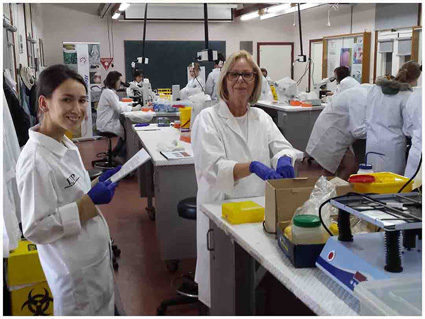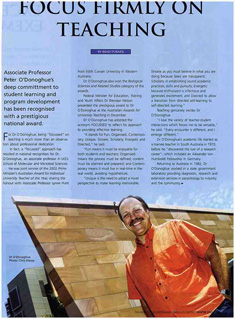Knowledge of infectious diseases is fundamental to both general biological sciences as well as vocational health sciences. I have therefore had a very broad teaching portfolio, reaching over 1,000 students each year in 10 courses in 3 Faculties: including foundational biology to science students, preclinical microbiology to medical, veterinary and science students, advanced parasitology to postgraduate students, problem-based learning in the Graduate Medical Course, and continuing education for medical and veterinary practitioners.
I have thoroughly enjoyed teaching not only core skills to freshers (particularly maths models and communication) but also vocational skills in the field of my expertise (parasitology) to pre- and postgraduates. I learnt a lot about teaching and learning (and myself) by completing a Graduate certificate in Education on the diversity and utility of higher education models. I was then fortunate enough to have won an Award for Excellence in Teaching at The University of Queensland in 2000, an Australian Award for University Teaching in the field of Biological Sciences, Health and Related Studies and was joint winner of the Prime-Minister’s Award for University Teacher of the Year in 2002. I was appointed Chief Examiner for the 15th International Biology Olympiad held in Brisbane in 2004.
I am a keen advocate of constructive alignment models in higher education and have been heavily involved in curriculum development and review (member of BSc Review Steering Committee, chairing Pedagogy Working Party, past Chair of two Teaching and Learning Committees, member of MBBS Biomedical Sciences Domain Committee, System Leader for Immunology, Infection and Defence, Nutrition and Metabolism in the Graduate Medical Program) and member of the Academic Board.
I also believe that academics would benefit greatly from institutionalized training in tertiary education (mandatory for primary and secondary school teachers), particularly projects involving contemporaneous courses so that students are the ultimate beneficiaries.


“Peter O’Donoghue exhibits outstanding levels of excellence in all aspects of his teaching and teaching related scholarship and inspires his students to reach high levels of achievement. He has introduced a range of innovative approaches in order to keep abreast of recent trends in teaching methods and techniques. Through multiple modes of delivery, such as interactive lectures, structured reading and practical sessions that make extensive use of videomicroscopy, he seeks to introduce his students to living examples of his field of interest, the microscopic protozoa. He is a very enthusiastic advocate for his subject, and this is repaid by the enthusiasm and interest of his students. A hallmark of Dr O’Donoghue’s teaching is his meticulous preparation. In all his teaching, regardless of level, Dr O’Donoghue is consistently praised by his students for his commitment and enthusiasm and for the clarity and interest of his lectures. His research complements his teaching by providing vocational context, technical skills, problem-based and self-directed learning experiences. Dr O’Donoghue is regarded as an outstanding teacher in the problem-based program within the Graduate Medical Course and provides leadership and advanced training in this area to his peers. He has an excellent conceptualisation of teaching and learning issues.”
As a tertiary teacher, I am utilitarian providing foundational and vocational education in microbiology and parasitology. I taught classes ranging from small-group tutorials (~10 students) to large-group lectures (100-300 students). I supervised postgraduate coursework and research students and taught problem-based learning in the Graduate Medical Course. I therefore represented the visible face of education to a diverse range of students and must be cognizant of educational imperatives and outcomes. This involved a considerable amount of preparation behind the scenes, both personally as content-specialist and institutionally as member of many curriculum committees.
As a practitioner and planner, I appreciate the integrated nature of educational theory and practice. I concur with Walker’s definition of curriculum as “referring to the content and purpose of an educational program together with their organization” and I used constructive alignment models to link curriculum objectives, teaching and learning activities and assessment criteria. I utilize formative and summative assessment for higher levels of understanding and have adopted the SACK alignment model for
assessing Skills, Attitude, Concepts and Knowledge.
Teaching must be tailored to meet particular learning circumstances and multiple techniques should be employed; ranging from traditional transmissivism models (knowledge transmitted to students) to modern social constructivist models (students construct meaning). There is no single solution to any particular teaching problem but I consider three essential ingredients to effective teaching and learning to be:
- defined process (transparent course structure – who, why);
- current content (relevant information – what, when, where); and
- dynamic delivery (interactive flexible delivery – how).
Process
It is important students realize teaching is not an ad hoc process but rather an orchestrated series of interactions designed to facilitate learning (in cognitive, affective and psychomotor domains). I translate educational jargon to students and explain teaching and learning models and processes so they understand and appreciate course structures, learning objectives, resource issues, benchmark criteria, modes of assessment and grading systems. Engagement empowers students, facilitates selfdetermination, engenders ownership, generates enthusiasm and stimulates feedback. Tertiary students constantly seek performance appraisal so I make extensive use of formative assessment to promote cooperation between classmates and stimulate learning. I criterion-reference higher cognitive level performances in summative assessment tasks and, where possible, align criteria with professional standards in consultation with industry and vocational authorities. I promote problem-based and selfdirected learning to encourage contextual and relational thinking and continuous self-assessment. I meet regularly with postgraduate students to discuss their progress, negotiate milestones, provide feedback and contemplate direction. I consider it imperative that they do not work in isolation but become involved in collaborative studies, group discussions and think-tank sessions to obtain a better perspective for their work. This promotes project development, resource utilization, multi-skilling,
interdisciplinary networking and personal development.
Content
Teachers must be curriculum aware and know how their material fits within prescribed courses. To this end, I was involved in curriculum development and review in all three faculties in which I taught. I ensured subject matter was contemporary, relevant and aligned with course objectives.
Parasitology is continually changing as the biotechnological revolution has facilitated rapid advances in organismal, cellular and molecular biology and mounting concerns over drug-resistance have altered treatment and control strategies. For each course, I tailor-made learning resource packages using multimedia software as many generalist textbooks only give superficial coverage while specialist texts are too detailed. I made a concerted effort to avoid superfluous material as students are deluged by information due to the IT revolution. I advocate a cautious approach to the internet as it is largely a ‘medium for mediocrity’ being swamped by sites with unedited superficial material. Students must become discerning and apply stringent filters when searching, retrieving, sorting and storing information. I demonstrated to students that I am involved in contemporary scientific research by presenting results of my studies and providing access to my publications.
Delivery
I used multiple modes of delivery to provide information to students and stimulate learning: including interactive seminar-style lectures (with discussion periods), structured reading (using paper and electronic media) and practical sessions (with hands-on demonstrations). I attempt to involve as many senses as possible, especially sight and sound but including touch, smell and taste as appropriate. Because protozoa are microscopic, I make extensive use of video-microscopy to show organisms to students (a picture can be worth a thousand words). Lectures are integrated with practical sessions to link theoretical knowledge with practical skills thereby reinforcing learning and providing vocational context. I use problem-based learning to stimulate social interaction, challenge concepts and encourage reflection.
My belief is that teaching must be FOCUSSED to ensure effective learning, that is:
F = fun (students and teachers must enjoy their interactions)
O = organized (process must be defined and content planned and prepared)
C = contemporary (examples and contextual meanings should reflect real-life)
U = unique (adopt a novel perspective to make learning memorable)
S = sincere (teachers must believe in what they are doing, fakes are transparent)
S = scholarly (establish sound academic practices and pursuits)
E = energetic (enthusiasm for a topic is infectious, generate excitement), and
D = directed (transition from directed self-learning to self-directed learning).




